- Home
- Ryan Casey
When Darkness Falls, Book 3
When Darkness Falls, Book 3 Read online
When Darkness Falls
Book Three
Ryan Casey
Higher Bank Books
Contents
Bonus Content
When Darkness Falls
Prologue
Chapter 1
Chapter 2
Chapter 3
Chapter 4
Chapter 5
Chapter 6
Chapter 7
Chapter 8
Chapter 9
Chapter 10
Chapter 11
Chapter 12
Chapter 13
Chapter 14
Chapter 15
Chapter 16
Chapter 17
Chapter 18
Chapter 19
Chapter 20
Chapter 21
Chapter 22
Chapter 23
Chapter 24
Chapter 25
Chapter 26
Chapter 27
Chapter 28
Chapter 29
Chapter 30
Chapter 31
Chapter 32
Chapter 33
Chapter 34
Chapter 35
Chapter 36
Chapter 37
Chapter 38
Chapter 39
Chapter 40
Chapter 41
Chapter 42
Chapter 43
Chapter 44
Chapter 45
Chapter 46
Chapter 47
Chapter 48
Want More from Ryan Casey?
If you want to be notified when Ryan Casey’s next novel is released and receive an exclusive free book from his Dead Days post apocalyptic series, please sign up to his mailing list.
http://ryancaseybooks.com/fanclub
Your email address will never be shared and you can unsubscribe at any time.
When Darkness Falls
Book Three
Prologue
Nobody was ready for the end of the world.
Some people thought they were, of course. Preppers, as they called themselves. People who set up self-sustainable homes, readying themselves and their families for whatever disaster might be about to strike. They became less reliant on the state and more reliant on the individual.
And truthfully, they were putting themselves at an advantage over the everyday person. They at least knew a thing or two about surviving, and how to respond to disaster. And in a perfect world, perhaps their plans might’ve rewarded them, all of them.
But it wasn’t a perfect world.
The problem with people preparing for the end of the world was that a lot of them only thought about the immediate problems. They thought about making sure they had a home that was well-guarded and easy to sustain. They thought about having the equipment to hunt with, the equipment to cook with. They thought about their ability to grow crops, to look after animals, to rely on farming to keep them alive.
But a lot of people didn’t account for the surprises nature had the potential to throw at them. Just as it always has been throwing surprises at everyone.
All it took, really, was for a freak batch of weather to destroy the crops. All it took was for one lunatic to sneak inside and kill all the animals. And all it took was for one person to be pushed over the edge by the pressure of the situation for them to do something really, really stupid…
This was the real world. The world where nothing could be predicted. The world where nothing could be taken for granted.
The same world as it had always been. Only now, people were really seeing it for what it was, the wool pulled from over their eyes, humanity’s true nature there on display in all its ugly glory.
Six months after The Event, humanity was uglier than ever.
The Coronal Mass Ejection—the one which a lot of survivors still alive figured must’ve hit—was devastating. What nobody knows for certain? That it was the most devastating solar event in history. They might be able to assume that much, simply from the fact that all these months after The Event, the power is still out, and all semblance of society as it used to be is gone. But nobody knows for certain. And people are a long way from finding out the truth, too.
There’s something else people don’t realise, too. Something that nobody understood, even if they might suspect as much. And that was a shocking statistic. A harrowing truth.
That truth was that the EMP event had already wiped out 80% of the population.
Globally.
The irony of that fact? Many experts thought that an EMP of this scale, in all their simulations and studies, would wipe out 90% of the population in that same time frame.
So really, humanity was doing much better than the experts predicted.
It was just a pity that a lot of those remaining 20% were willing to go to extreme lengths to keep themselves alive… and that remaining 20% were directly responsible for at least a percentage point of that 80% of the population dead.
See, there may be no society as it used to be, but it would be wrong to suggest that societies themselves have died out completely. Quite the opposite, in fact—there are hundreds of thousands of mini-states right across the globe. There is a form of order, different in each and every area. Some of it is dictatorial. Some of it is community-driven. But there is one thing in common in all of these societies. There is one thing that unites them; something sparked by the collapse of power and the destruction of electronic communication.
That one thing in common?
Trust has defined them, for better or for worse.
It isn’t in human nature to trust blindly. Sure, in the old world, we trusted experts because they were elevated to squeaky-clean pedestals in order to win our hearts and our wallets. But even in that old world, we started to doubt the advice of experts. The post-truth world was already blossoming right around the time the CME hit and dug humanity’s grave once and for all.
But in this world, everyone has seen the ugliness of humanity for themselves, now. Nobody is clean.
So trust is hard to come by.
And for that reason, the world is made up of those hundreds of thousands of mini-states, and not one or two or even hundreds of larger states.
Everyone does their own thing.
And that’s how it will keep on going.
But there isn’t complete gloom to be taken from this. After all, 20% of the population remaining is still around 1.4 billion survivors in this world. And although that number will grow smaller—although it’ll dip below the billion mark before the year is out—the very fact that a massive number of people are still alive, especially when the majority had got so accustomed to the comforts of the old world, shows that humanity could survive. It could prosper. But most of all, it could pull together, if it really wanted to. If it really tried.
And not all of those 1.4 billion people still left are “bad people.” In fact, hardly any of them are, really. They are just normal people like you and me. But they are in control of their own choices. They are in control of their actions. And they own them and have to live with them, forever.
There are still groups of survivors in this impossible world. There are still people out there, still alive.
This is the story of one of those people.
This is the story of Alex Glover.
A man who has fought.
A man who has lost.
A man with problems, with demons, just like you and I.
This is the story of his new life.
This is the story of his survival.
And this is the story of the moment where everything changes for Alex Glover, all over again…
Chapter One
I looked at the bottle of milk in my hand after I’
d finished milking the cow and I couldn’t deny the sense of satisfaction that grew inside my body.
It was early morning. Morning was always the most peaceful time of day. I could hear the wind blowing strongly outside, leaves scraping against the ground, a sure sign that autumn was on its way. It’d been a nice summer. Warm, dry, with just enough rain to provide us with easy access to water. But it did at the same time feel like we were papering over the cracks a little. Because I knew deep down that not every summer was going to be as easy as the one we’d just had.
And winter was on its way. So things were going to change all over again.
I patted Agnes the cow on her back. “Good girl,” I said. “Always co-operative. I like that about you.”
She glanced up at me and let out a moo. I took it as a compliment that she appreciated my milking skills.
I walked down the middle of the barn, bottles of milk all in a bag by my side. We had twenty cows, and all of them were healthy and well. A little too healthy, perhaps, judging by the putrid smell of methane that clung to my nostrils—and my clothes—every time I came in here. It wasn’t a smell I hated, in all truth, as bad as I knew it was. Reminded me of trips to the countryside before the world went to shit. Reminded me of old times. Of better times.
I looked around at the cows as they tucked into their feed.
At least I had them.
At least I had Sarah.
At least I had our child, who would be with us in a matter of weeks.
I put the milk bottles to one side and made my way out of the barn and into the grounds of the farm complex that we were living on. Really, our home was beautiful. Idyllic. We’d been taken in by a larger group six months ago after the tragedy that struck Sarah and me—the tragedy that cost our son, Bobby, his life. I didn’t like to think back to those times too much. Too many hard memories. A grief that I’d never conquer.
But at least I knew we were here. We’d found somewhere.
And in Bobby’s honour, we were starting again.
Or at least doing the best job we could.
I made my way across the muddy ground towards the chicken pen. I saw someone in the distance, but I kept my head down, quickly hurried over to the hens so I could feed them.
They all came running up to me, pecking at my feet as I tucked into the seed for them—mixed with their own eggs to give them a bit of extra nutrition.
“You hungry, girls?” I asked, throwing them seed.
They didn’t stick around to answer my question.
I looked over my shoulder as I fed the hens. I could see someone walking around. Michael, he was called. He was an alright guy. Lost his wife at the beginning. Talkative. Generous. Everything you wanted from a neighbour, really.
But still the hackles on the back of my neck raised whenever I came close to interacting with somebody. Somebody who wasn’t Sarah or Suzy or Ellie.
And I figured that’d just be the way it was for the rest of my life.
I made sure I was low down as I tucked into the chicken feed, giving them more and more. I didn’t want to draw any attention to myself. I just wanted to get on with my jobs. I just wanted to—
“Hey, Alex.”
When I heard the voice, the hairs on my arms rose.
I turned around. And when I turned, I saw Betty.
Betty was another nice woman. Dark hair interspersed with silvery streaks. Rake thin, although she insisted she’d been that way even before the end times struck. A staunch vegan, although that had been challenged by the circumstances of the new world, admittedly.
She was smiling at me. And I knew I should smile back. I knew I should just be friendly; be normal.
But all I could do was raise my eyebrows, nod, then return to feeding the hens.
“Looks like they’re getting a real treat today,” she said.
My heart pounded faster. I swallowed a lump in my throat. “Yeah. Well. They deserve it.”
Betty nodded. “That they do.”
An awkward silence hung in the air. I knew I should at least attempt to fill it.
“Anyway,” Betty said, breaking the silence for me. “I’ll leave you to it. If…”
She didn’t carry on speaking after that “if.” And I wanted to ask her what she wanted. What she was going to say.
But it was already too late.
Betty had turned away and was walking off.
I watched as she disappeared into the distance, heading over towards the caravans that we all had as our homes. They were static caravans that had been here when I’d arrived. Apparently, the guy who initially ran this place had managed to keep hold of a working tractor and had hauled them over here within the safety of his grounds. Sadly, he wasn’t around anymore, and neither was his tractor. But it’d provided us with lots of living space, that was for sure.
I saw the movement of people inside those caravans. Heard the growth of conversation building. And I knew if I got this job done quick enough, I could get out of the way so I didn’t have to be around when everyone got up—
“Good to see your social skills are still on point.”
I spun around.
Suzy was leaning against the fence of the chicken hutch, smile on her face.
I tutted and shook my head. “Don’t do that.”
“Don’t do what? Talk to you?”
I stepped out of the large hutch, one of the more boisterous hens pecking at me for more food. “Sneak up on me like that.”
“Why not?” Suzy asked. “Don’t say you’re going off me now, too?”
I shook my head. I didn’t like it when Suzy wound me up about how I was with this group. After all, I’d lost a son at the hands of humanity. I’d seen what people were capable of.
The awful, hardest thing of all was that I didn’t believe the man who killed my son to be evil.
He was just someone who had made a mistake.
And as far as I saw it, anyone who was human was capable of making a mistake.
“We’re going out in a couple of days,” Suzy said, changing the conversation swiftly as I walked beside her.
“Out where?”
“We’re looking to expand,” she said.
I stopped then. I wished I hadn’t because I knew I was drawing attention to myself, but there wasn’t a thing I could do about instinctive reactions.
“I thought that might be your reaction.”
“I just don’t get why we have to—”
“We have to because humanity depends on us pulling together. It depends on us trusting one another. It depends on us building. This place is good. Forty-six people, that’s good. But we need more resources if we are to thrive. And joining up with another group of a similar size, that’s the best way to pool resources.”
“I don’t see the logic in expanding the population when resources are already limited.”
“That’s because you’ve got your people-hating blinkers on. See the bigger picture and you’ll realise it’s exactly what we need.”
I was silent, then, as Suzy and I walked through the idyllic grounds, our feet crunching through the autumn leaves.
“You have to push yourself, Alex,” she said. “You have to snap out of this.”
“I don’t have to snap out of anything.”
Suzy opened her mouth, then shook her head and sighed. “If you don’t, God help us all.”
I was about to bite back at Suzy again when I saw someone running towards us.
“Hold up. Is that Adam?”
I watched Adam race towards us. And as he ran, my heart pounded. Because he looked worried. He looked concerned.
And he was the man on watch at the gate.
I wanted to turn away. I didn’t want to deal with whatever news Adam had. I didn’t want to face it. Not now.
But when he reached us, he put his hands on his knees, panting heavily.
“What is it?” Suzy asked.
Adam—short, jet black hair, little tubby around the mid-section—looked r
ight into my eyes as he re-caught his breath. “You’re going to want to see for yourself,” he said.
I narrowed my eyes and prepared myself for the inevitable.
“Someone’s at the gates,” he said. “And he has big news. News that we’re all going to want to hear. And he wants us to hear it urgently.”
Chapter Two
I walked towards the main gates and I knew already what I was going to do about the newcomer supposedly bringing “important news.”
The early morning sky had turned grey. The wind was picking up. In the distance, I could hear the cows mooing loudly, like they could sense something was on the horizon. I knew I should know better than to be so superstitious, but I’d had hunches and ominous feelings in the past and they’d ended up turning out well-warranted.
Besides. After the things I’d been through—after the things I’d lost, especially at the hands of “newcomers” arriving at gates—I was well within my rights to feel wary of outsiders.
And although it wasn’t technically my decision to turn people away—although I wasn’t top of the food chain here and couldn’t make that kind of order—I was going to do whatever I could to make sure this situation didn’t escalate, whatever that may mean.
I could see there were more people gathered around the gates. A small crowd waiting to find out what was happening, what this newcomer was saying. And that disconcerted me somewhat. Because the more this man was saying, the more of a chance he was being given to get his point across.

 Apocalypse
Apocalypse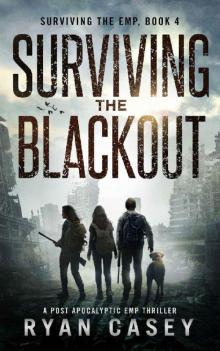 Surviving the Blackout: A Post Apocalyptic EMP Thriller (Surviving the EMP Book 4)
Surviving the Blackout: A Post Apocalyptic EMP Thriller (Surviving the EMP Book 4) Ritual
Ritual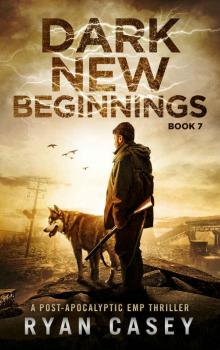 Dark New Beginnings (Into the Dark Post-Apocalyptic EMP Thriller Book 7)
Dark New Beginnings (Into the Dark Post-Apocalyptic EMP Thriller Book 7)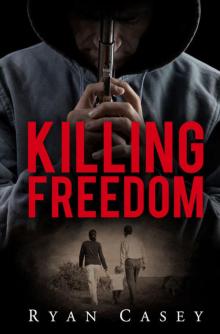 Killing Freedom
Killing Freedom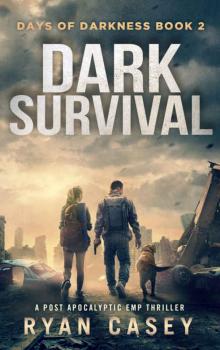 Dark Survival
Dark Survival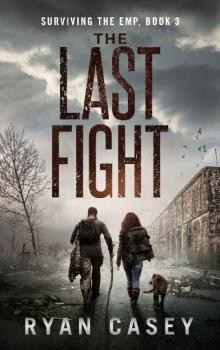 The Last Fight: A Post Apocalyptic EMP Thriller (Surviving the EMP Book 3)
The Last Fight: A Post Apocalyptic EMP Thriller (Surviving the EMP Book 3)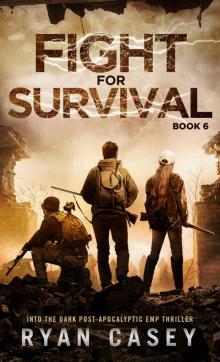 Into the Dark: A Post-Apocalyptic EMP Thriller
Into the Dark: A Post-Apocalyptic EMP Thriller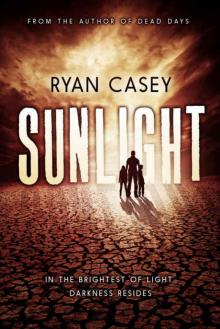 Sunlight
Sunlight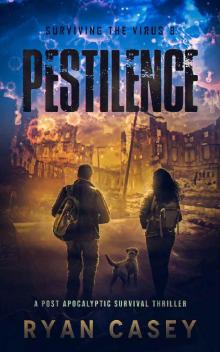 Pestilence: A Post Apocalyptic Survival Thriller (Surviving the Virus Book 8)
Pestilence: A Post Apocalyptic Survival Thriller (Surviving the Virus Book 8)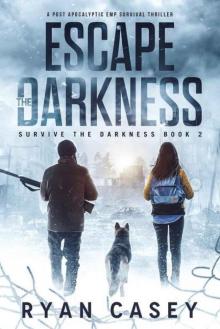 Survive The Darkness | Book 2 | Escape The Darkness
Survive The Darkness | Book 2 | Escape The Darkness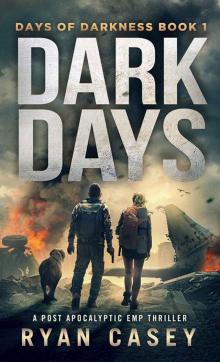 Dark Days
Dark Days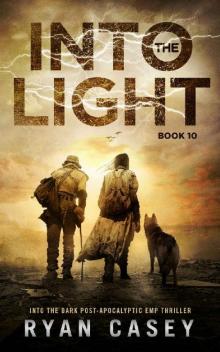 Into the Light: A Post-Apocalyptic EMP Thriller (Into the Dark Book 10)
Into the Light: A Post-Apocalyptic EMP Thriller (Into the Dark Book 10)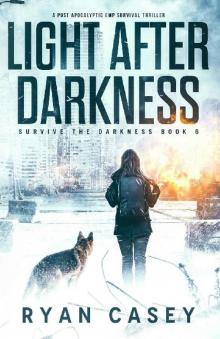 Light After Darkness: A Post Apocalyptic EMP Survival Thriller (Survive the Darkness Book 6)
Light After Darkness: A Post Apocalyptic EMP Survival Thriller (Survive the Darkness Book 6)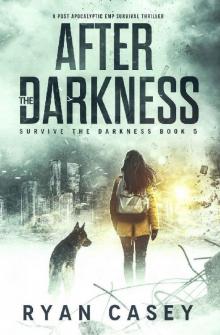 After the Darkness: A Post Apocalyptic EMP Survival Thriller (Survive the Darkness Book 5)
After the Darkness: A Post Apocalyptic EMP Survival Thriller (Survive the Darkness Book 5)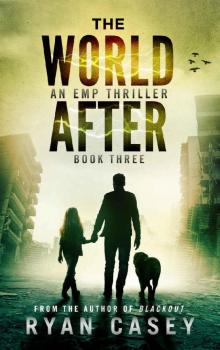 The World After (Book 3)
The World After (Book 3)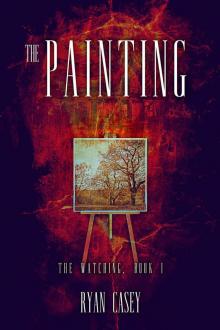 The Painting
The Painting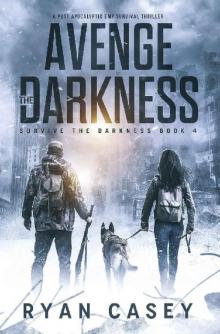 Avenge the Darkness: A Post Apocalyptic EMP Survival Thriller (Survive the Darkness Book 4)
Avenge the Darkness: A Post Apocalyptic EMP Survival Thriller (Survive the Darkness Book 4)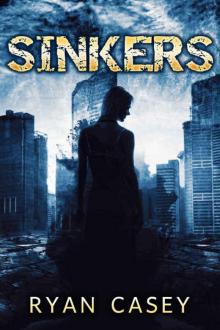 Sinkers
Sinkers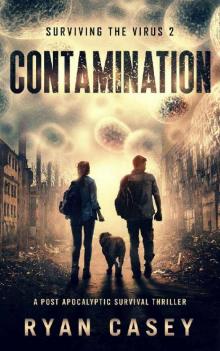 Contamination
Contamination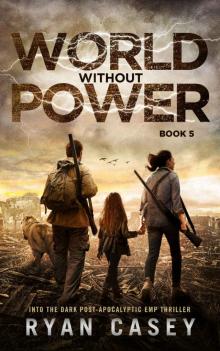 World Without Power (Into the Dark Post-Apocalyptic EMP Thriller Book 5)
World Without Power (Into the Dark Post-Apocalyptic EMP Thriller Book 5)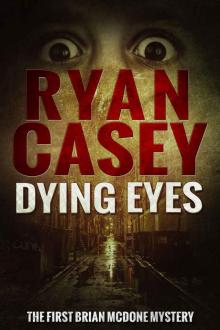 Dying Eyes (Brian McDone Mysteries)
Dying Eyes (Brian McDone Mysteries)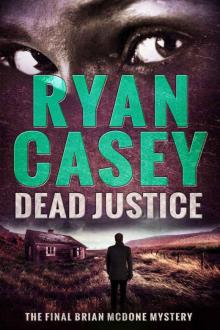 Dead Justice
Dead Justice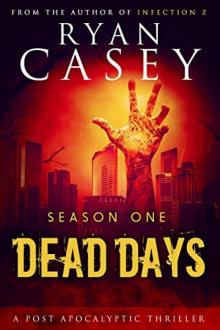 Dead Days Zombie Apocalypse Series (Season 1)
Dead Days Zombie Apocalypse Series (Season 1)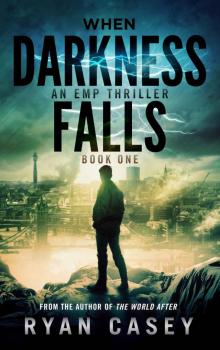 When Darkness Falls: An EMP Thriller
When Darkness Falls: An EMP Thriller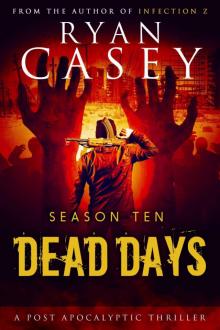 Dead Days Zombie Apocalypse Series (Season 10)
Dead Days Zombie Apocalypse Series (Season 10)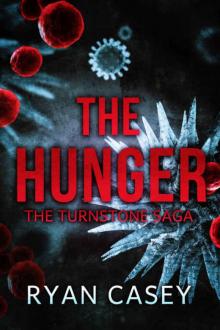 The Hunger
The Hunger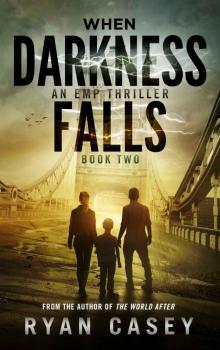 When Darkness Falls, Book 2
When Darkness Falls, Book 2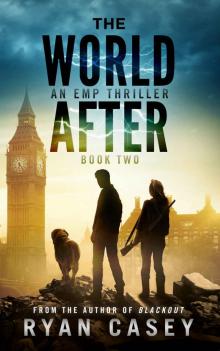 The World After, Book 2
The World After, Book 2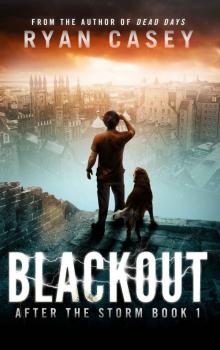 After the Storm (Book 1): Blackout
After the Storm (Book 1): Blackout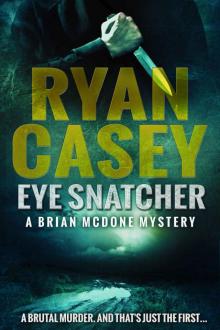 Eye Snatcher
Eye Snatcher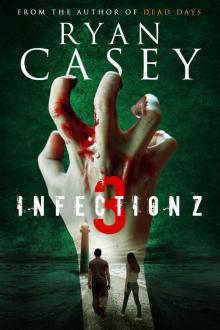 Infection Z 3
Infection Z 3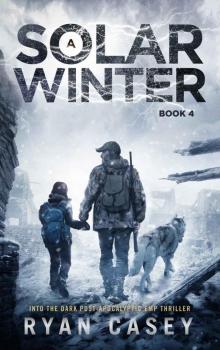 A Solar Winter
A Solar Winter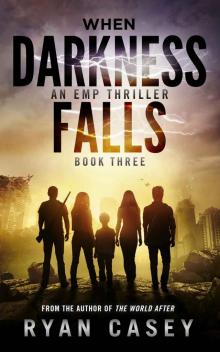 When Darkness Falls, Book 3
When Darkness Falls, Book 3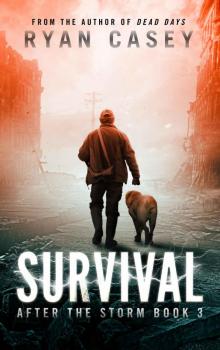 Survival (After the Storm Book 3)
Survival (After the Storm Book 3)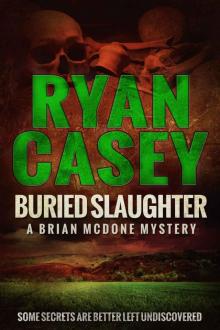 Buried Slaughter (Brian McDone Mysteries)
Buried Slaughter (Brian McDone Mysteries)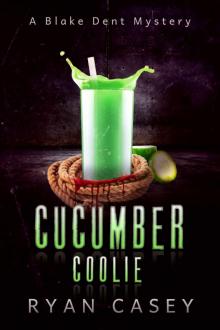 Cucumber Coolie (Blake Dent Mysteries Book 2)
Cucumber Coolie (Blake Dent Mysteries Book 2)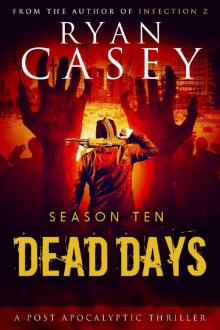 Dead Days Zombie Apocalypse Series
Dead Days Zombie Apocalypse Series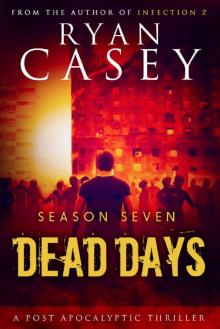 Dead Days Zombie Apocalypse Series (Season 7)
Dead Days Zombie Apocalypse Series (Season 7)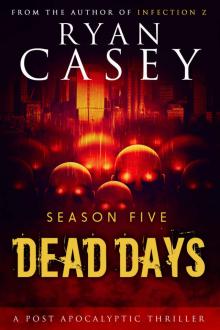 Dead Days Zombie Apocalypse Series (Season 5)
Dead Days Zombie Apocalypse Series (Season 5)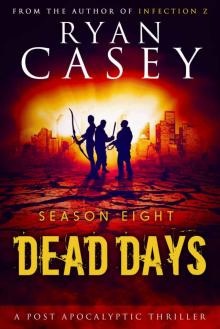 Dead Days Zombie Apocalypse Series (Season 8)
Dead Days Zombie Apocalypse Series (Season 8)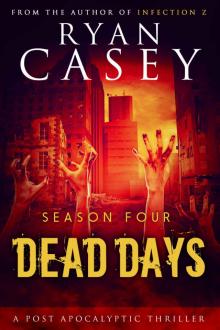 Dead Days: Season Four (Dead Days Zombie Apocalypse Series Book 4)
Dead Days: Season Four (Dead Days Zombie Apocalypse Series Book 4) Into the Dark
Into the Dark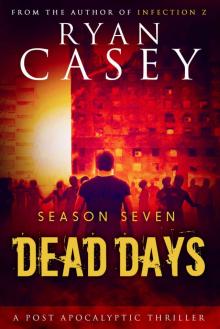 Dead Days: Season Seven (Dead Days Zombie Apocalypse Series Book 7)
Dead Days: Season Seven (Dead Days Zombie Apocalypse Series Book 7)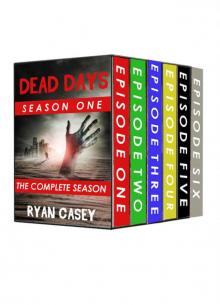 Dead Days: The Complete Season One Collection (Books 1-6)
Dead Days: The Complete Season One Collection (Books 1-6)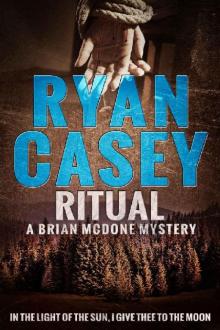 Ritual (Brian McDone Mysteries Book 5)
Ritual (Brian McDone Mysteries Book 5)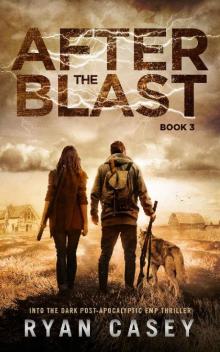 After the Blast
After the Blast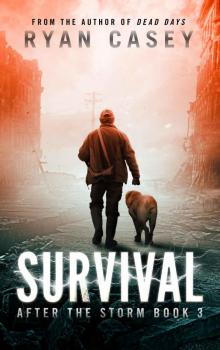 After the Storm (Book 3): Survival
After the Storm (Book 3): Survival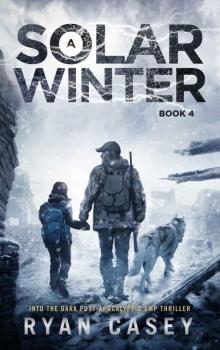 A Solar Winter (Into the Dark Post-Apocalyptic EMP Thriller Book 4)
A Solar Winter (Into the Dark Post-Apocalyptic EMP Thriller Book 4)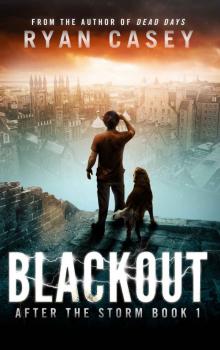 Blackout (After the Storm Book 1)
Blackout (After the Storm Book 1)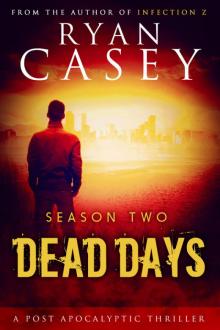 Dead Days: The Complete Season Two Collection
Dead Days: The Complete Season Two Collection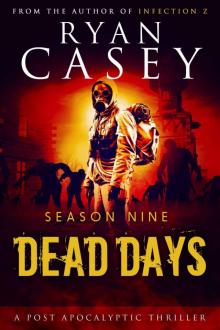 Dead Days Zombie Apocalypse Series (Book 9)
Dead Days Zombie Apocalypse Series (Book 9)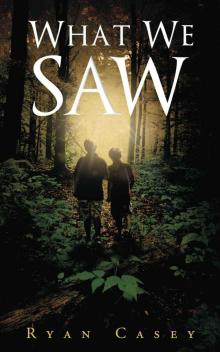 What We Saw
What We Saw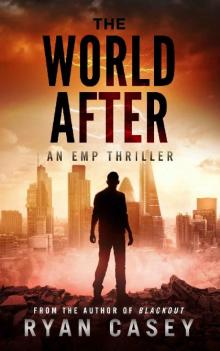 The World After: An EMP Thriller
The World After: An EMP Thriller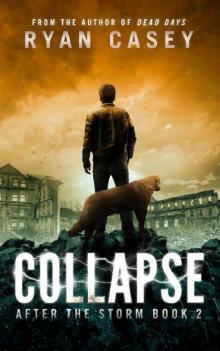 Collapse (After the Storm Book 2)
Collapse (After the Storm Book 2)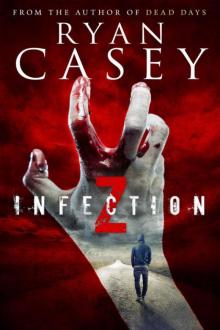 Infection Z
Infection Z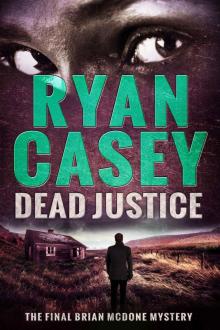 Dead Justice (Brian McDone Mysteries Book 6)
Dead Justice (Brian McDone Mysteries Book 6)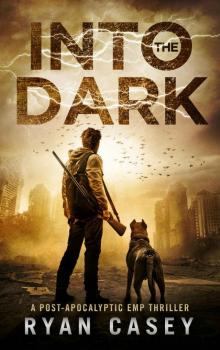 Into the Dark (Into the Dark Post-Apocalyptic EMP Thriller Book 1)
Into the Dark (Into the Dark Post-Apocalyptic EMP Thriller Book 1)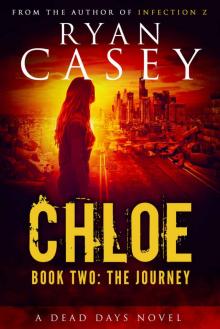 Chloe Zombie Apocalypse series (Book 2): The Journey
Chloe Zombie Apocalypse series (Book 2): The Journey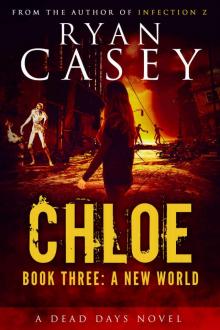 Chloe Zombie Apocalypse series (Book 3): Chloe (A New World)
Chloe Zombie Apocalypse series (Book 3): Chloe (A New World)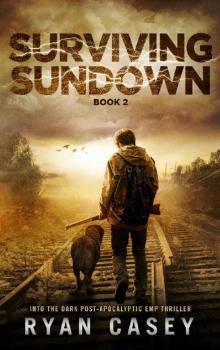 Surviving Sundown (Into the Dark Post-Apocalyptic EMP Thriller Book 2)
Surviving Sundown (Into the Dark Post-Apocalyptic EMP Thriller Book 2)